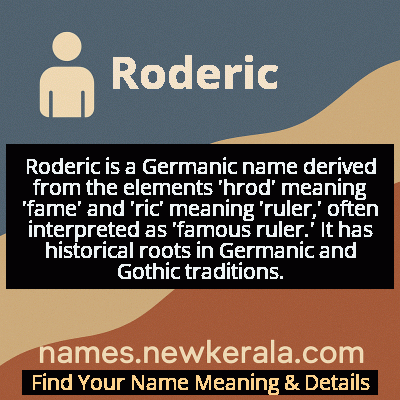Roderic Name Meaning & Details
Origin, Popularity, Numerology Analysis & Name Meaning of Roderic
Discover the origin, meaning, and cultural significance of the name RODERIC. Delve into its historical roots and explore the lasting impact it has had on communities and traditions.
Name
Roderic
Gender
Male
Origin
German
Lucky Number
9
Meaning of the Name - Roderic
Roderic is a Germanic name derived from the elements 'hrod' meaning 'fame' and 'ric' meaning 'ruler,' often interpreted as 'famous ruler.' It has historical roots in Germanic and Gothic traditions.
Roderic - Complete Numerology Analysis
Your Numerology Number
Based on Pythagorean Numerology System
Ruling Planet
Mars
Positive Nature
Generous, passionate, energetic, and humanitarian.
Negative Traits
Impulsive, impatient, moody, and can be overly emotional.
Lucky Colours
Red, maroon, scarlet.
Lucky Days
Tuesday.
Lucky Stones
Red coral, garnet.
Harmony Numbers
1, 2, 3, 6.
Best Suited Professions
Military, sports, philanthropy, leadership roles.
What People Like About You
Courage, energy, leadership, generosity.
Famous People Named Roderic
Roderic of the Visigoths
King
Last Visigothic king of Hispania who ruled during the Muslim conquest of the Iberian Peninsula
Roderic O'Connor
High King of Ireland
Last High King of Ireland before the Norman invasion, known for his military campaigns and political leadership
Roderic Murchison
Geologist
Influential British geologist who established the Silurian system and served as director of the Geological Survey
Roderic Bowen
Politician
Welsh Liberal Party politician who served as MP for Cardigan and made significant contributions to Welsh politics
Name Variations & International Equivalents
Click on blue names to explore their detailed meanings. Gray names with will be available soon.
Cultural & Historical Significance
The name's cultural journey reflects broader European historical patterns, from its Germanic origins through Visigothic Spain to Celtic Ireland and Norman England. This cross-cultural adoption illustrates how names can travel and adapt while retaining their core meaning. In modern times, Roderic maintains a presence in academic and aristocratic circles, often chosen by families valuing historical connections and traditional naming practices. The name's various linguistic adaptations—from Spanish Rodrigo to French Rodrigue—show how it has been naturalized into different cultural contexts while preserving its essential character. This cultural flexibility, combined with its strong historical roots, gives Roderic a unique position in the pantheon of European names that bridge multiple traditions and historical periods.
Extended Personality Analysis
Individuals named Roderic typically exhibit a complex blend of leadership qualities, intellectual depth, and personal integrity. The name's meaning of 'famous ruler' seems to influence personality perceptions, with many Roderics demonstrating natural authority and strategic thinking abilities. They often approach challenges with careful consideration and long-term planning, reflecting the wisdom expected of historical leaders. While confident in their capabilities, they tend to be modest about their achievements, letting their work speak for itself. In social settings, Roderics may appear reserved initially but reveal warmth and loyalty to those who earn their trust. Their decision-making style combines intuition with rational analysis, making them effective in positions requiring both vision and practical implementation.
Psychologically, the name appears to carry expectations of responsibility and ethical conduct. Many Roderics develop strong moral compasses and feel a sense of duty toward their communities or organizations. They often excel in fields requiring leadership under pressure, such as management, academia, or public service. The historical weight of the name seems to inspire a concern for legacy and meaningful contribution rather than temporary success. While they can be determined and persistent in pursuing goals, they typically avoid arrogance or authoritarian behavior, preferring to lead through example and competence. This balance of strength and humility makes Roderics respected figures in their personal and professional circles, often serving as mentors or trusted advisors to others.
Modern Usage & Popularity
In contemporary naming practices, Roderic occupies a distinctive niche as a traditional yet uncommon choice. The name currently ranks outside the top 1000 names in most English-speaking countries, maintaining a steady but modest usage pattern. Modern parents who choose Roderic typically value historical significance and strong etymology over current trends, often selecting it as an alternative to more popular classical names like Alexander or William. The spelling 'Roderick' is more common in everyday usage, while 'Roderic' appeals to those seeking a more authentic or continental European flavor. Recent years have seen a slight increase in usage as part of the vintage name revival movement, particularly among educated, upper-middle-class families in urban areas. The name performs better in the United Kingdom and Ireland than in North America, reflecting its stronger cultural roots in those regions. In professional contexts, the name often conveys an impression of sophistication and heritage, making it popular in academic, legal, and business circles where traditional values remain appreciated.
Symbolic & Spiritual Meanings
Symbolically, Roderic represents the intersection of personal achievement and historical legacy. The name embodies the concept of earned authority rather than inherited privilege, reflecting the Germanic ideal of leadership based on merit and reputation. Metaphorically, it suggests a bridge between tradition and innovation—honoring historical roots while remaining relevant in contemporary contexts. The name's components ('fame' and 'ruler') symbolize the relationship between public recognition and responsible power, implying that true leadership requires both accomplishment and the wisdom to wield influence properly. In psychological terms, Roderic represents the archetype of the transformational leader who guides others through periods of change while maintaining ethical integrity. The name also carries subtle themes of resilience and adaptation, as exemplified by historical figures who faced epochal challenges. This symbolic richness makes Roderic more than just a personal identifier—it becomes a narrative about the enduring human quest for meaningful leadership and lasting impact on one's community and era.

